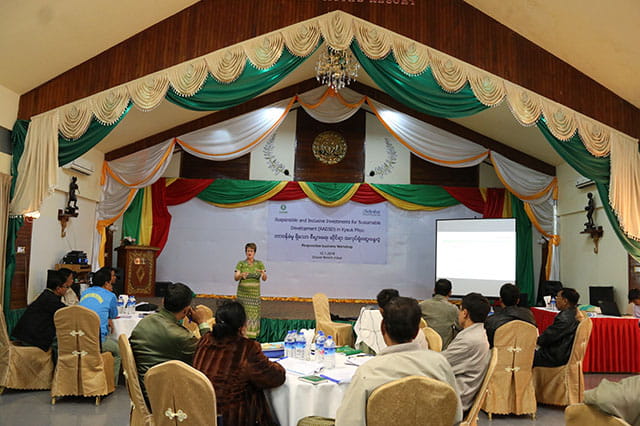Workshops on Responsible Business in Rakhine State

In December and January, members of the MCRB team were involved in workshops for civil society organizations (CSOs) and government departments in Kyaukphyu and Sittwe in Rakhine State, working with local CSO Scholar Institute, with support from Oxfam.
On 12, 13, 14 December, separate workshops were held in Kyaukphyu on “Practices in Responsible Business and Constructive Engagement” for local CSOs and for the local General Administration Department (GAD). The civil society workshop introduced responsible business concepts and international standards to 25 CSO participants. These were put in the context of Myanmar laws on investment and environmental impact assessment (EIA), and international standards on environmental and resettlement, including IFC Performance Standard 5 (available in Burmese), as well as good practice for companies to develop operational grievance mechanisms to handle complaints from communities and other stakeholders.
Community members were able to discuss these issues in the context of the planned Kyaukphyu Special Economic Zone, and its potential positive and negative impacts on livelihoods and the environment, and how to engage with the project proponents. MCRB highlighted the opportunity presented by the recommendation in the Rakhine Advisory Commission report to conduct a Strategic Environment Assessment (SEA) for developments in the Kyaukphyu area, as this would provide the opportunity to consider the cumulative impacts of multiple projects, and carrying capacity of the area, for issues such as the likely growth in water consumption by industrial and residential users.
A condensed version of the workshop on responsible investment, Myanmar law and international standards was provided for the Kyaukphyu General Administration Department (GAD). In both cases, the importance of collaboration between government and communities and transparency and consultation was highlighted, and the need for local voices to be heard in the project planning stage to avoid problems in future.
On 12 January, the MCRB team, together with Scholar Institute, held a similar workshop for around 22 government officials in Sittwe, including from GAD, Agriculture and Labour.
The workshops also addressed the various meanings and understandings of the term corporate social responsibility (CSR). MCRB highlighted the importance of differentiating between what a company must do to address its negative impacts, and what it can choose to do through activities to ‘create shared value’ that benefit both businesses and local communities, and thereby enhance its social license to operate, and the distinction between this, and philanthropy unrelated to business activity.
 English
English မြန်မာ
မြန်မာ မြန်မာ (unicode)
မြန်မာ (unicode)










